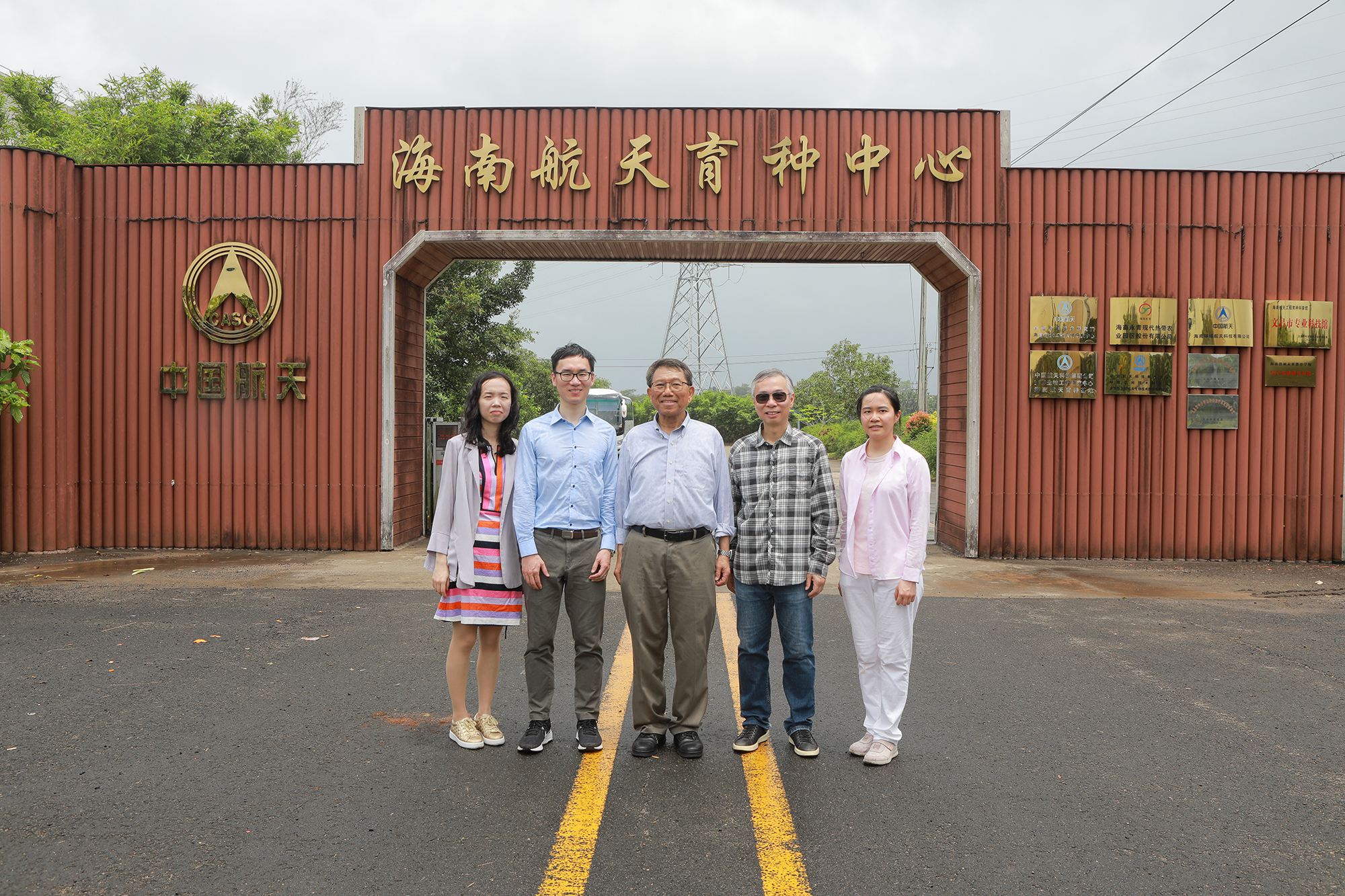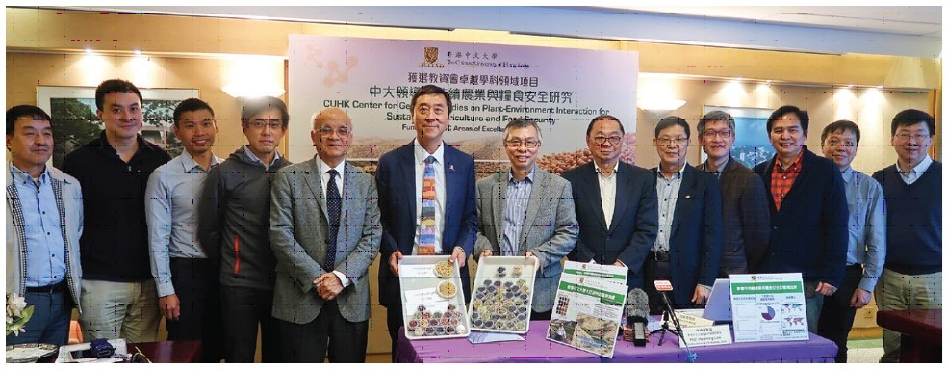Global agriculture is increasingly challenged by limitations in freshwater resources, topsoil depletion, and extreme temperatures due to climate change. As a result, sustainable agriculture has become a top national priority, aiming at enhancing food security, economic stability, and environmental sustainability.
Among different crops, soybean is unique as it can provide a major edible protein and oil source for food and feeds (amounting to 70% of total world’s plant protein supply and 29% world’s plant oil supply). Soybean is also a major source of raw materials for functional healthy food products such as dietary fibers and secondary metabolites.
In addition, due to the symbiotic nitrogen fixation capacity of soybean, it was estimated that cultivation of 1 Ha of soybean could fix 100 Kg nitrogen per year, equivalent to a saving of 900 Kg carbon dioxide. Cultivation of soybeans on marginal farmland hence could replenish soil nutrients with minimal negative effects to the environment.
Prof. Lam Hon-Ming, Director of the State Key Laboratory of Agrobiotechnology (The Chinese University of Hong Kong), has been working on the identification of stress tolerance genes in soybean for over 20 years. In 2010, Prof. Lam published a cover article in the renowned scientific journal Nature Genetics, reporting the decoding of 31 wild and cultivated soybean genomes that revealed a much higher biodiversity in wild soybeans1 . In 2014, his team has successfully identified and cloned a major salt tolerance gene from wild soybeans. This finding was published in Nature Communications, a multi-disciplinary scientific journal ranked just after Nature and Science. This is a milestone in the mass production of high quality salt tolerant soybeans, a stage reached which will eventually benefit agriculture worldwide2.
Prof. Lam also led an international effort to construct the world's first wild soybean high-quality soybean reference genome, which was published in 2019 in Nature Communications, providing an important tool for soybean researchers and breeders3. To facilitate better genomic data dissemination, his team built an open portal as a freely accessible datahub, with both open-sourced and tailored-made genomic tools.
Utilizing the team’s scientific discovery of the most effective native salt-tolerance soybean gene existing in both cultivated and wild soybeans by far, Prof. Lam collaborated with soybean breeders in China to successfully generate four new stress tolerant soybean varieties which passed the regional testing of the Gansu Province for large-scale cultivation4-7. Per local seed station estimation, up to 2023, cumulative acreage of these varieties has exceeded 78,000 hectares, spanning 2,000 km of the Loess Highland. Additional income brought to local farmers was estimated at RMB 97 million.
Recently, Prof. Lam’s efforts of promoting sustainable soybean cultivation have also been extended to developing countries including South Africa and Pakistan, with the aims to improve incomes of subsistent farmers and raise women’s social status8-11. Prof. Lam's team has donated some stress-tolerant seeds as a starter and organized workshops to train local scientists. The final goal is to enable local scientists to perform genetic crosses and selections, and develop local breeding programs to empower underprivileged farmers with improved economic sustainability.
To further enhance soybean breeding technology, Prof Lam, in collaboration with CRRIST and SBG, launched the first agricultural research project into space in 2023 to investigate potential mutagenesis of soybean and rhizobium under space conditions12-17. The team will conduct thorough analyses of the valuable specimens returned from space to understand the mutation mechanisms of soybean seeds, with the goal to achieve breakthroughs in agricultural technology and identify new soybean seed materials with promising applications, ultimately enriching national strategic agricultural germplasm resources.
Links for reference:
1. https://www.cpr.cuhk.edu.hk/en/press/breakthroughs-by-cuhk-boosts-soybean-research-make-cover-in-nature-genetics/
2. https://www.cpr.cuhk.edu.hk/en/press/cuhk-professor-finds-salt-tolerance-gene-from-wild-soybeansa-possible-way-to-alleviate-salinization-problem-of-farm-lands/
3. https://www.cpr.cuhk.edu.hk/en/press/cuhk-professor-lam-hon-ming-announces-worlds-first-reference-grade-wild-soybean-genome/
4. https://m.huanqiu.com/article/4J9AgOWHMAG
5. https://m.sfccn.com/2023/5-30/0NMDE0NzNfMTgzMTU0Ng.html?lang=EN
6. https://www.chinadaily.com.cn/a/202208/31/WS630f4520a310fd2b29e75415.html
7. https://www.rthk.hk/tv/dtt31/programme/itnewera/episode/785081?lang=zh-hant
8. https://cn.chinadaily.com.cn/a/202410/02/WS66fd2d25a310b59111d9c8b6.html
9. https://www.youtube.com/watch?v=HeM54Mm9m60
10. http://csr.cuhk.edu.hk/wp-content/uploads/2024/10/%E8%9E%A2%E5%B9%95%E6%88%AA%E5%9C%96-2024-10-04-%E4%B8%8B%E5%8D%884.20.20.png
11. https://news.mingpao.com/pns/%e5%89%af%e5%88%8a/article/20240707/s00005/1720281675597/%e7%a4%be%e6%9c%83%e5%af%a6%e9%a9%97-%e4%b8%ad%e5%a4%a7%e7%a0%94%e7%99%bc%e7%a8%ae%e5%ad%90-%e5%8f%af%e9%ab%98%e6%ba%ab%e7%a8%ae%e6%a4%8d-%e5%8e%bb%e5%b7%b4%e5%9f%ba%e6%96%af%e5%9d%a6%e7%a8%ae%e5%a4%a7%e8%b1%86
12. https://m.huanqiu.com/article/4J9AlD4cILX
13. https://www.facebook.com/ITIBHK/videos/1627172941456065/?mibextid=WC7FNe&rdid=j8aXfP9MmP1aj8Dg
14. https://www.youtube.com/watch?v=p3aGHw9rFTQ
15. https://www.fengshows.com/video/ade96a27-49d8-44e9-84ea-82d9d215174a
16. https://www.cpr.cuhk.edu.hk/tc/press/cuhk-research-project-taken-to-space-by-tianzhou-6-first-hong-kong-agricultural-project-to-be-launched-into-space/
17. https://www.cpr.cuhk.edu.hk/tc/press/cuhk-soybean-taken-into-space-by-shenzhou-16-the-second-part-of-the-first-hong-kong-agricultural-space-research-project-launched/
 |
 |



